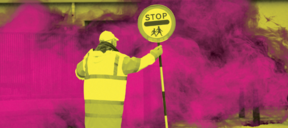Valproate scandal: Parents feel failed by State over drug that harmed their children
Noteworthy finds that pleas for help from women impacted by valproate (Epilim) continue to be dismissed.

“MY WORLD FELL apart that day when I saw the news. It was telling me something I knew in my head and my heart, but I hoped that I was wrong.”
Debbie Adams flicked on TV while grabbing her nightly meds at a wedding abroad in 2017. She was devastated by a report from the UK which revealed that the dangers of women using the epilepsy drug sodium valproate – sold under the brand name Epilim in Ireland – had been kept from patients for decades.
At her clinic appointment in an Irish hospital just six months earlier, she asked the neurologist she saw that day – she saw different doctors at the clinic almost every time she attended – if there was any connection between her taking valproate and the developmental problems that her three- and five-year-old daughters were experiencing
[The doctor] turned away from me and said ‘there is no correlation between Epilim and these conditions’.
The hospital in question stated to Noteworthy that they do not comment on individual cases but advised that patient advisory liaison services should be contacted by patients with “issues of concern”.
The Sky News report she was watching revealed that campaigners had discovered documents in The National Archives which suggested that, in July 1973, UK regulators decided not to warn patients directly for fear it “could give rise to fruitless anxiety”.
Before her pregnancy, because she had to stay on her medication, Adams was warned of the risk to her children of spina bifida and cleft lip palate.
However, she was not warned of any risks of developmental delays or impairments, despite this impact being reported to health officials decades previously and added to the drug’s regulatory documentation in the early 2000s. “Had I known going in, I could have been more prepared.”
It was “heart-breaking and horrendous” before the concerned mother received a proper diagnosis for her daughters who both have severe disabilities. They have since been diagnosed with fetal valproate syndrome (FVS) – a condition that is caused by exposure of the unborn baby to the drug.
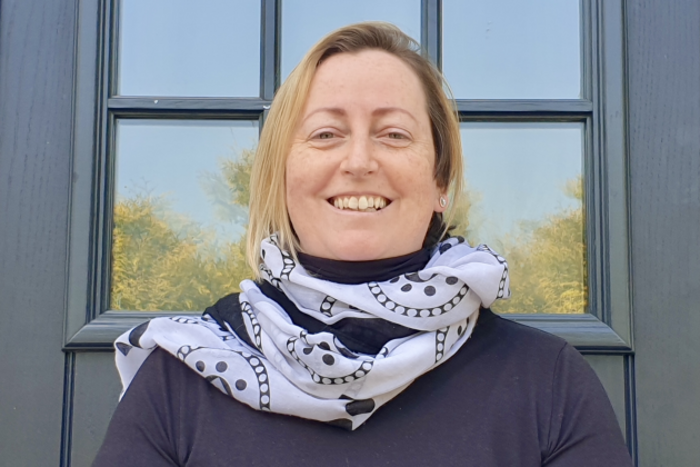 Debbie Adams says she is battling every single day to get help for her daughters.
Debbie Adams says she is battling every single day to get help for her daughters.
Unfortunately, this is far from a unique case. It was known since its availability in Ireland in the 1970s that valproate may cause birth defects if used in pregnancy.
Yet, for decades many women across the world were prescribed this drug without being warned of the different risks by their doctors.
For years, campaigners here have pleaded with politicians and people in power to investigate this scandal which has left over 3,000 babies in Ireland potentially exposed to this drug and its damaging side effects.
Last year, a UK report found that women were “dismissed, overlooked and ignored for far too long”. Our Noteworthy investigation finds that pleas for help from women impacted by valproate in Ireland continue to be dismissed, with families “battling every single day” for services for their children. We reveal:
- No timeframe for inquiry promised by the Minister for Health.
- On findings of international reports, expert psychiatrist says Ireland “is no different”.
- The recommended ‘full suite of services’ for affected children is non-existent, resulting in families paying thousands for therapies and other costs.
- Nurses required for full implementation of a pregnancy prevention programme and national response to valproate not appointed.
- Valproate pregnancy registry delayed due to the pandemic.
- Promised stakeholder group to examine effectiveness of risk minimisation measures not established.
- Patient groups concerned some women at risk are still not being informed.
It is recommended that valproate should not be used in girls and women of childbearing potential unless other treatments are ineffective or not tolerated.
However, it is used as an effective epilepsy treatment for other groups. There are health risks in switching a prescription from valproate to another anti-epileptic. The HSE state that such a process takes time and must be conducted by a specialist.
***
A ‘fast’ five months
Anti-Convulsant Syndrome (OACS) Ireland and Epilepsy Ireland were delighted last November when Health Minister Stephen Donnelly committed to holding an inquiry into the historical licensing and use of valproate.
In his statement following the announcement of an inquiry, Donnelly said: “I have asked officials in my department to begin work on this as a priority, and have emphasised the need for a fair and fast inquiry.”
Despite this “fast” promise, almost five months on, little progress has been made.
Both OACS Ireland and Epilepsy Ireland told Noteworthy that they made a submission to the Department on the inquiry in January. Karen Keely of OACS Ireland said they “have heard nothing positive back to date”.
Peter Murphy, CEO of Epilepsy Ireland, said “essentially nothing has happened” as far as he is aware, but he wants “to see something quickly” as promised.
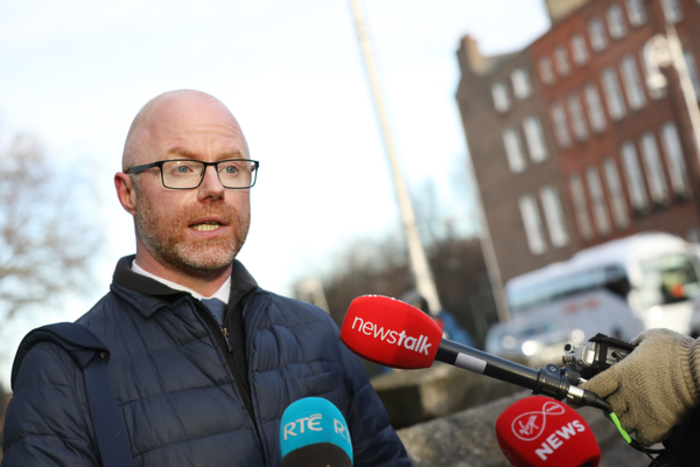 Donnelly promised a fair and fast inquiry last November. Campaigners are still waiting for a timeframe.
Donnelly promised a fair and fast inquiry last November. Campaigners are still waiting for a timeframe.
A Department spokesperson said that details of the inquiry “are being considered by officials within the Department of Health”. When asked this week if there was any update on when the inquiry is expected to commence and report its findings, they added:
There is no update available on the timeframe for the proposed inquiry.
Róisín Shortall, TD and co-leader of the Social Democrats, told Noteworthy that “it is truly baffling that the Minister would commit to the inquiry and then immediately put it on a back burner”. She added that families deserve answers.
Five months on, there is still no action or progress to be seen. The impacted families are left waiting with no resolution to their concerns. What is the hold up?
The announcement of an inquiry followed years of campaigning by Irish patient groups, as well as a UK report published four months earlier which found women had “suffered at the hands of clinicians who do not, or who chose not to listen and have been abandoned by a system that fails to recognise and then correct its mistakes at the earliest opportunity”.
The report titled ‘First Do No Harm’ found the system there “is not safe enough for those taking medications in pregnancy”. Amongst its recommendations was an immediate UK Government apology to survivors and families of those affected as well as a redress scheme.
In Ireland, a HSE report estimated that between 153 and 341 children will have experienced a major congenital malformation and up to 1,250 children will have experienced a neurodevelopmental delay from exposure to valproate between 1975 and 2015.
Children exposed to the drug while in the womb are at a high risk of serious developmental disorders (in up to 30-40% of cases) and congenital malformations (in approximately 10% of cases), according to Epilepsy Ireland.
Ireland ‘no different’
Unlike campaigners in the UK, Irish patient groups are still waiting for answers. OACS Ireland has not been given access to minutes of a key meeting between the drug company – since taken over by Sanofi – and the Irish regulator, the then National Drugs Advisory Board, or to other key documents that they have requested.
“I want the inquiry because I want the truth, I want to see those documents and I want accountability,” said Keely. “I want to know why they let it go on for so long and not do anything to stop it.”
She has been a leading voice in bringing this scandal to the fore, both here and across the EU. All three of her sons, now in their 20s and 30s, were born with fetal valproate syndrome (FVS) after she was not informed of the risks by either her GP or neurologist.
Two of her sons require ongoing care and Keely worries about what will happen to them as she gets older.
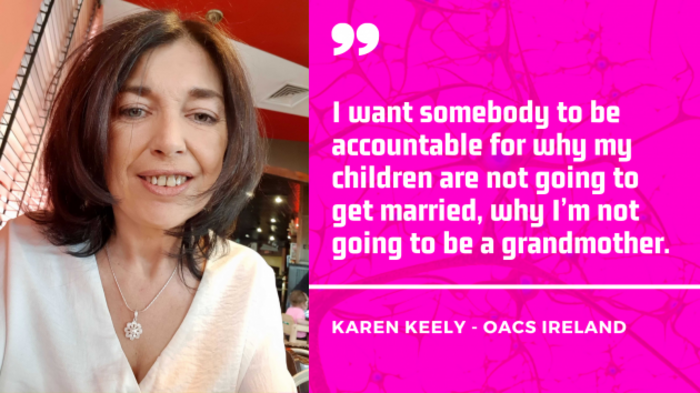
Professor Anthony McCarthy from the College of Psychiatrists of Ireland is an expert in valproate use in pregnancy. He is a consultant perinatal psychiatrist in the National Maternity Hospital in Holles Street and regularly assesses the risk of patients staying on their prescription drugs during pregnancy.
In addition to its current use in epilepsy, valproate had been used for treatment of bipolar and other forms of mental illness in the past, including depression when standard treatments have not worked.
He hopes that those who have been injured will get the clearest answers possible in the inquiry, but fears that if the overall system is found to be at fault – rather than any individuals – that could be really hard for people.
I doubt our inquiry is going to come to any answers that are different to anywhere else.
McCarthy thinks “almost certainly people were not being told enough”, though added “probably” as he couldn’t state this with full certainty. “The appreciation of the level of risk was – in general – only increasing as the years went by and, yes, should have been there before.”
He said that in 2017 this message was everywhere. That year a public hearing was held by the European Medicines Agency (EMA) on the drug to find out if recommendations to minimise the risk of harm from valproate to unborn babies were working.
“Before that, it wasn’t everywhere. I’m sure there were people who weren’t informed.” He thinks that doctors here “were no different”, and said “sometimes they didn’t know [of the risk], sometimes they didn’t inform”.
Lack of recommended services
In 2018, the Oireachtas Joint Committee on Health published a report on fetal valproate syndrome (FVS) – also known as fetal anti-convulsant syndrome (FACS). They made a number of recommendations “to provide support to those affected” and “to establish a platform to investigate historical decisions and procedures that failed to prevent” this syndrome.
One of the key recommendations to help families was “that a full suite of services would be agreed with families within eight weeks of the publication of this report”. Two and a half years later, families are still waiting to get access to this promised “suite of services”.
A Department of Health briefing to the Joint Committee in November 2020, obtained by Noteworthy through a Freedom of Information (FOI) request, lists the actions taken in response to the recommendations. For this particular action, it wrote that “the HSE has had ongoing engagement with families affected by FACS/FVS since 2018”.
However, there was no mention of the services for families. When Noteworthy asked the HSE why this full suite of services had not been agreed and if there was a timeline for implementation, a spokesperson stated that “the HSE focused on setting up an dedicated FVS diagnostic clinics, prioritising patients where there is a referral with a query of FVS”.
They continued:
The capacity building exercise included the funding and the appointment of 5.8 [whole time equivalent] posts which included a consultant paediatrician, consultant geneticist, administration support, laboratory geneticist, advanced nurse practitioner posts and a data manager.
The spokesperson also stated that a care pathway “had been agreed within the hospital and community”, with the first step being an assessment for FVS. After this, “correspondence” is issued to the “Community Healthcare Organisation in relation to the client needs”.
When asked how many families have gone through this pathway, the HSE stated: “There are 13 clients in receipt of services and there is no-one awaiting access to the care pathway.”
The DOH briefing mentioned the ‘HSE Valproate Response Project’ which included patient representatives from both OACS Ireland and Epilepsy Ireland.
A report from this project was finalised in 2019 but remains unpublished by the HSE. A spokesperson said that this was because it “was a HSE project and there was no plan to publish the report”.
Noteworthy obtained this report through FOI – you can access this document here.
This report states that a care pathway for people and families who have FVS diagnosis would include a “HSE package of community supports” but no specific supports are mentioned in this report.
However, Noteworthy had seen a report from March 2019 from the HSE Valproate Community Operations Sub-Group which lists in detail the supports recommended. It states that “early intervention is required to detect and treat early behavioural or developmental issues, requiring for example early speech therapy, occupational therapy, physiotherapy, psychology”.
In addition to these interventions, other aspects of the recommended community supports included a discretionary medical card “without the need for the standard assessment process”, an exemption from prescription charges, out-of-pocket healthcare expenses or drug costs, reimbursement of parking charges, as well as accommodation, travel and childcare costs for agreed medical appointments.
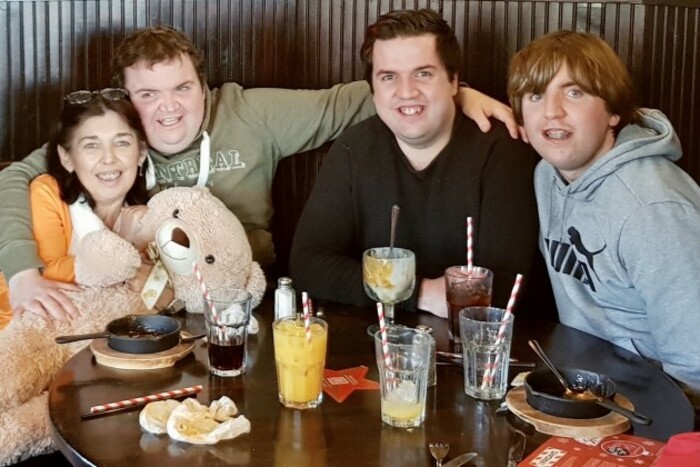 Karen Keely of OACS Ireland with her three sons.
Karen Keely of OACS Ireland with her three sons.
None of these supports have been implemented to date, according to OACS Ireland.
When the Department of Health was asked if there are any plans for patients who have FVS or their families to receive a medical card, a spokesperson stated that “the provision of medical cards to patients with FVS [is] among the measures being considered by the Department and the HSE as part of the overall response to issues relating to sodium valproate”.
“My child is not a consideration,” responded Keely, when told by Noteworthy of this statement. “Surely the HSE and Department of Health can do everything in their power to make these children and the women’s lives a little easier.”
She said that they both could have acted in 2018 when they got the first set of recommendations but “all they’re doing is dragging their heels” which survivors and their families are “getting sick of”.
‘Astonishing’ costs to families
Adams estimates that she has spent over €5,000 on private medical care and therapies for her two daughters, now aged seven and nine. “I borrowed every cent of it off my father-in-law”, she explained. “Without him the girls wouldn’t have it, because I can’t work.”
Having previously had a job she loved as a dental nurse, Adams is now a full-time carer for her daughters as she cannot get a childminder to look after their complex needs.
To date, her daughters have been assessed by physiotherapy, occupational therapy and psychology but they haven’t received regular appointments. The only therapy they currently receive from the HSE is a total of three hours of speech therapy every 18 months, given in 30-minute slots.
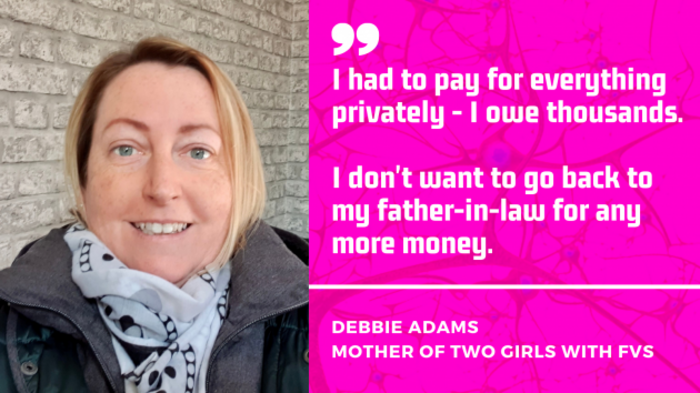
Access to support services and medical cards would make a huge difference to their family and “take off the pressure of having to worry about medical bills,” according to Adams. She would no longer have to weigh up the cost of going to the doctor herself or the cost of medication due at the end of the month.
“These are things that I never thought I would have to worry about. This landed on my doorstep and isn’t something that I did by choice.”
Keely from OACS Ireland said that the cost to look after children with FVS “is astonishing”, with the Government expecting “the mothers to pay for everything”. She added: “Why should we have to pay for harm done?”
To support families, OACS Ireland is calling for a redress scheme. A compensation scheme is already in place in France and was part of the recommendations of the recent UK report on valproate.
A spokesperson for the Department of Health did not directly reply to a query from Noteworthy when asked if the inquiry will address compensation of those affected by valproate, but stated that details of the inquiry “are being considered”.
Required nurses not appointed
In addition to supporting families already impacted by valproate, the HSE Report that Noteworthy obtained through FOI had a number of key measures that the report stated: “should greatly enhance our ability to reduce harm in the future”.
The Programme for Women’s Health in Epilepsy was one such measure that is to coordinate the national response to valproate. This programme is needed in order to fulfil both the European and Irish regulators’ requirements that women taking valproate are required to have yearly follow-ups and be kept up to date with developments with the drug.
Two advance nurse specialists have been appointed to date to work in the Coombe and Holles Street maternity networks. However, four more nurses were supposed to be appointed for the remaining four maternity networks around the country, according to the 2019 report Noteworthy obtained through FOI.
Noteworthy asked the HSE if funding had been put in place for the additional four nurses and when they would be appointed. A spokesperson stated that there was a “request for additional funding as part of the 2021 estimate process”.
This programme is needed “to coordinate the risk management aspects of valproate”, according to Epilepsy Ireland’s Murphy. He added that annual checks are also important for the Valproate Pregnancy Prevention Programme.
The HSE told Noteworthy that “approximately 50% of women who are taking valproate” are on the Pregnancy Prevention Programme.
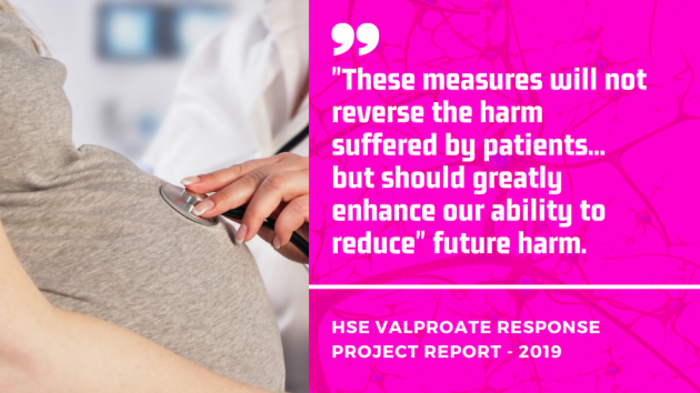
Epilepsy Ireland conducted a survey last year which showed that one in three (33%) are unaware that, when taken in pregnancy, the drug can cause learning and developmental problems in children. It also found that one in six were unaware that the drug can cause serious birth defects.
Their results also “showed that the majority of women don’t even know about [the] pregnancy prevention programme, nevermind having completed it”, said Murphy.
The reason these nurses are important is to accelerate that process and make sure that all the women who are of childbearing potential are met every year by their specialist team.
The Irish drug’s regulator, the Health Products Regulatory Authority (HPRA), told Noteworthy it was aware of this survey. “Together with other parties in the Irish healthcare system, action to address concerns has been and continues to be taken.”
A spokesperson added that a reminder Drug Safety Newsletter was distributed in May 2020 and an annual redistribution of education materials took place in February 2021.
Register delayed by pandemic
Another measure that has been both recommended by the Oireachtas Joint Committee, as well as internationally, is the establishment of a register to record women who were prescribed valproate during pregnancy, as well as all people affected by fetal valproate syndrome (FVS). Neither of these registers are currently in operation in Ireland.
Noteworthy asked the HSE for data on the number of women who miscarried while taking valproate as well as the number of deaths due to exposure to valproate in utero in 2019 and 2020, but a spokesperson said that “no data is available on miscarriages nor fetal death in utero”.
One of the findings of the ‘First Do No Harm’ UK report last year was that, “despite concerns about the [risk of birth defects] at the time of licensing, no system was put in place to collect data on the outcomes of pregnancy in women” taking valproate or similar drugs.
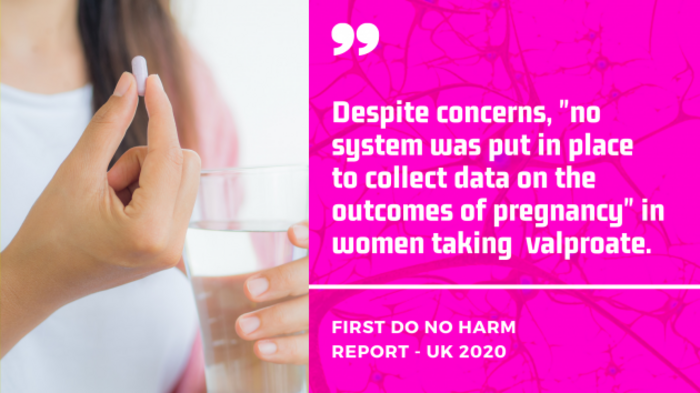
The 2018 Oireachtas Joint Committee report stated that “the establishment of a register is imperative to allow a central point of reference for patients and to allow further examination of the effects of valproate”.
When asked for an update on this, a spokesperson for the HSE said that a “resource has been funded to develop a registry to record women who have been prescribed sodium valproate during pregnancy”.
This is a complex piece of work and has been delayed due to the Covid pandemic.
The development of a register of patients affected by FVS “is being considered”, the spokesperson added.
The register of patients with FVS is important to “understand more about the impact of fetal valproate syndrome, what the needs are and to be able to track that over time”, according to Murphy from Epilepsy Ireland.
“All of these risk measures have all gone to ground.” To address this, Murphy said that the stakeholder group – promised by Minister Stephen Donnelly – is needed.
“All these gaps can be looked at and can be dealt with by all stakeholders that need to be involved – patient groups, the HSE, pharmacists, everybody.”
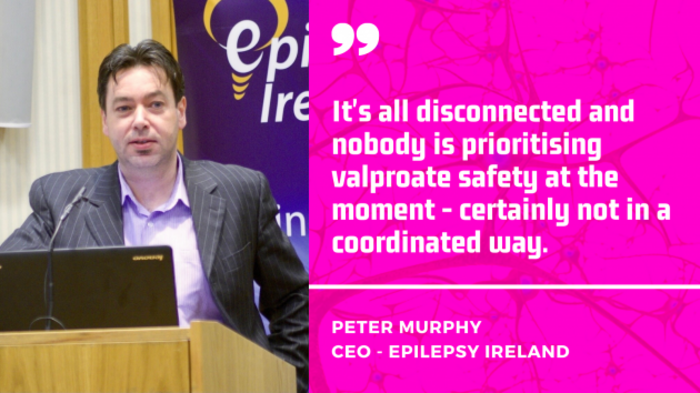
In response to a parliamentary question in November 2020, Minister Donnelly said he “will be asking the HSE and other relevant agencies to form a stakeholder group to consider the effectiveness of risk minimisation measures in place for sodium valproate and, potentially, for other medicines”.
When asked about this, the Department of Health first said “the establishment of a valproate stakeholder group” was “being considered”. When asked for clarification, given the Minister’s statement in November, the Department spokesperson said:
There is ongoing engagement between the Department and relevant agencies regarding sodium valproate. However, a formal stakeholder group has not been established to date.
***
‘Unacceptable’ women still unaware
With many recommended measures “under consideration” and others delayed or not implemented to date, patient groups are concerned that women are still not being informed of the risks of valproate which, they say, will lead to more children being born with FVS.
Murphy said that there has been a lot of work done by the HPRA since 2018 following new European regulations. Extra warnings have been added to patient information leaflets and medical professionals have been informed numerous times of the risks of valproate use.
Although the number of women who do not know about the risks is going down, “there are still people out there who don’t know”, he added.
It’s unacceptable in this day and age. Everyone is aware of what needs to be done.
In addition to the promised inquiry and implementing the recommended risk minimisation measures for women taking valproate, all that Keely wants is for the State to make the lives of the impacted families easier.
“They’re not asking for diamonds or pearls. They’re asking for help for their children. Children that have been harmed by a toxic drug.”
***

This investigation was carried out by Maria Delaney of Noteworthy, the investigative journalism platform from TheJournal.ie. It was proposed and funded by you, our readers with support from the Noteworthy general fund to cover additional costs.
You may be interested in a proposed investigation which is almost funded – SYSTEM OVERLOAD - where we want to delve into issues faced by the creaking public health system.
You can support our work by submitting an idea, funding for a particular proposal or setting up a monthly contribution to our general investigative fund HERE>>




